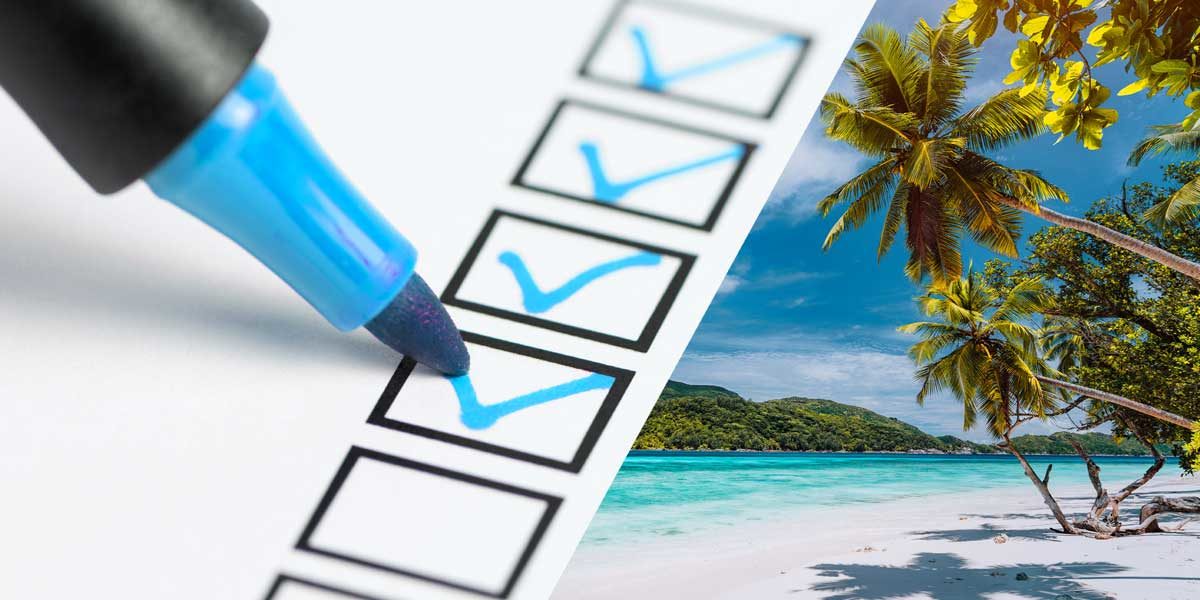Preparing for a vacation isn’t just about packing your suitcase. During the winter months, you also need to consider what to do with your house when travelling. Protect yourself from stressful surprises that could undo your relaxing holiday with our Winter Vacation Home Checklist!
Winter is a busy time of year for us Scarborough and East York plumbers, because sudden temperature shifts can cause pipes to freeze and burst. A burst pipe can lead to severe damage in your home—especially if no one’s around to notice it.
In this article, we’ll go through three major steps to safeguard you if a problem happens at home while you’re away. By following this article, you can prevent problems and ensure you’re protected in case something does go wrong.
1. What to do with your house when travelling
It doesn’t take much to get your home ready before you travel. With relatively little effort, you could save thousands of dollars in repairs if there’s an emergency.
Here are the do’s and don’ts to get your house ready before you leave for a vacation.
Don’t turn the heat down too low.
It’s tempting to try to save heating costs by setting your thermostat way down while you’re gone. However, you need to be careful because if the heat is too low, you risk one of the pipes in your home freezing.
Frozen pipes can burst and, later on when the ice melts, cause your basement to flood. The cost of replacing your furniture and flooring, plus getting the pipe repaired, is much higher than any money saved on heating.
According to the CBC, 16°C is the perfect temperature to save energy costs while still preventing a frozen pipe. However, if your home has bad insulation or any pipes along external walls, we recommend a higher temperature. Owners of older homes, like those in the Beaches, Leslieville and Cabbagetown, should be particularly careful.
(Learn more about Flooded Basements: Causes, Prevention and What to do)
Do shut off the main valve and drain the pipes
You can greatly reduce or remove the risk of basement flooding by making sure there’s no water in your pipes while you’re away.
Shortly before leaving for your vacation, close the main water shutoff in your home. Open the faucets on any taps in your basement so the water left in the pipes can drain out. Once the faucets stop draining entirely, it’s safe to close them back off.
Where do I find the main water shutoff?
The main shutoff or building valve is the main potable water pipe coming into your house at the water meter. In most older homes, the water meter is located at the front wall of the basement, close to the ground. You should see a valve, which you can turn to shut off the water. If the valve has a handle, turn it counter-clockwise to shut off the water. If it’s a lever, turn it so the handle is horizontal.
2. Ask someone to do a full walkthrough every three days
If you’re leaving your home empty while on holiday, ask a friend or neighbour to stop by at least every three days to check for problems.
Why every three days? Because many insurance companies won’t cover you for damages unless someone regularly inspects the property. It’s fairly common for insurance policies to require someone coming check your home every three days.
When you’re making arrangements with your friend or neighbour, make sure you ask them to do a full walkthrough of the home each time. It’s no use having someone stop by if they only peek in the front hallways—and don’t notice the water pooling in the basement.
3. Make sure your insurance company covers water damage
Not all insurance companies and policies are alike. If yours doesn’t cover water damage—and there’s a chance it doesn’t—you want to know before your basement floods.
If you’re not 100% certain about what your home insurance plan does and doesn’t cover, find out before you leave for a vacation. A quick phone call costs you nothing and it could save you a nasty (and expensive!) surprise later.
Go through your Winter Vacation Home Checklist
With a little planning, you can protect yourself from problems that could damage your property—and cost you stress and money.
There’s no need to spend your vacation worrying about an emergency back home. After following along with this checklist, you can relax and enjoy your vacation, knowing that you’ve taken the proper precautions. Bon voyage!
Do you live in East Toronto and have a plumbing emergency or problem? Contact Neighbourhood Plumbing today and we’ll help you out!
